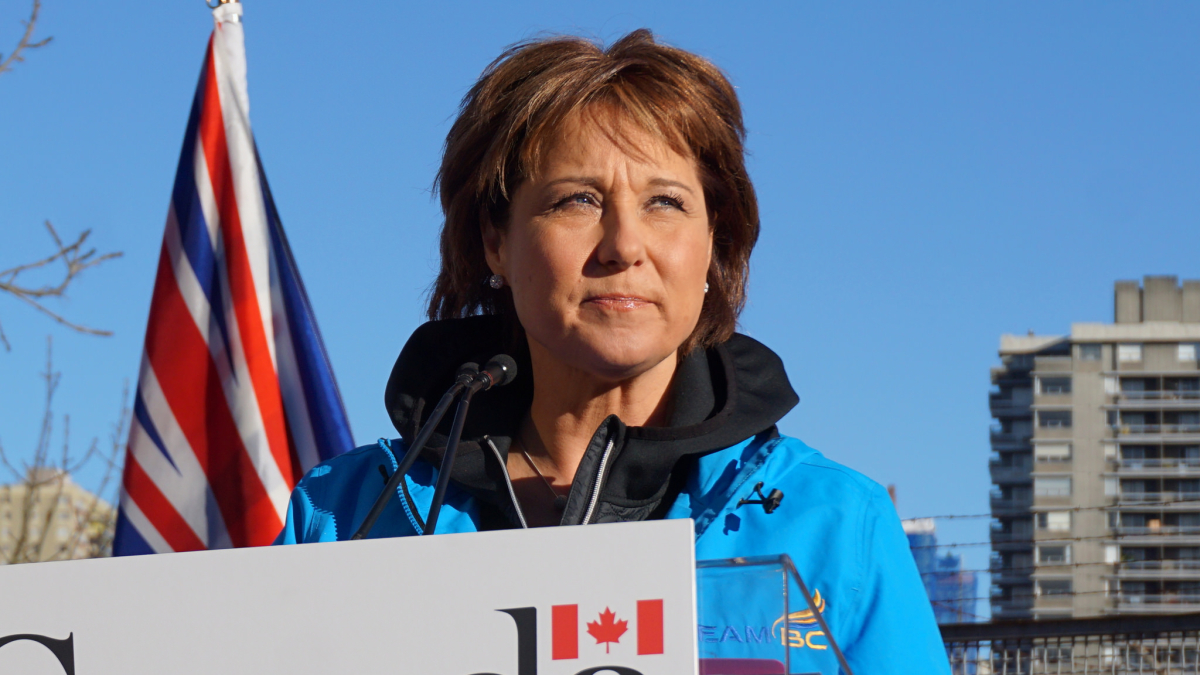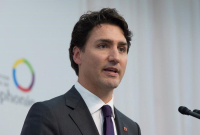Support strong Canadian climate journalism for 2025
B.C. Premier Christy Clark says the Kinder Morgan Trans Mountain pipeline expansion is "very close" to meeting the five environmental, financial, and legal conditions she needs to endorse the new pipeline. But she wants to ensure her province secures some benefits that outweigh risks that have prompted fierce opposition on the west coast.
Federal approval of the controversial project, which would send up to 890,000 barrels of crude oil per day from Alberta to ports and refineries on the west coast, was announced Tuesday by Prime Minister Justin Trudeau. More than a dozen municipalities and First Nations have formally opposed the project and several hundred staged a rally against the pipeline soon after Trudeau's green light.
"We bear in British Columbia the bulk of the risk for this, so we want to make sure we get a fair benefit from it," Clark told reporters at a press conference Wednesday. “What British Columbians expect is that their premier is going to stand up, fight to protect their province, and find the balance between economy and jobs."

Project must meet spill response requirements
A provincial environmental assessment of the Trans Mountain expansion is still underway, and Clark said the federal government — along with Texas-based Kinder Morgan — must still work through a number of provincial approval details. Ottawa has met three of five conditions laid out so far, she explained.
To receive the green light in B.C., she explained, the proponent must demonstrate that it has "world-leading" marine and land oil spill response, prevention and recovery systems; has addressed Aboriginal treaty rights; and is providing ample opportunity for First Nations to benefit from the project. British Columbians must also receive a fair share of the fiscal and economic benefits, reflecting the level, degree and nature of the risk assumed by the province, she added.
The province initially rejected the Trans Mountain expansion project in January when it appeared the proponent could not meet all five conditions, but the pipeline has remained incredibly polarizing ever since. It threatens to increase tanker traffic in local waters by 600 per cent, critically endanger the Southern resident orca population, and compromise vital cultural and economic resources for First Nations and nearby communities.
Clark not worried about election consequences
If conditions are met, Clark's stamp of approval could cost her party votes in the May provincial election in major urban centres that have opposed the pipeline, including Vancouver, Burnaby, North Vancouver, Port Moody, Victoria, Surrey, Langley, and Abbotsford. At the press conference, however, Clark said that she wasn't too worried about the political impact of her government's decision.
The B.C. Green Party has firmly rejected the project, and New Democrat John Horgan, the official opposition leader, has said that the "risky proposal is not in B.C.'s best interests."
"I think when people decide who they want to support politically, I think they do it based on whether or not those people have clear and consistent principles," Clark explained. "I have not changed my position for even one day that these projects can 'get to yes' if they meet those (five) conditions. We are going to hold to that."

Trudeau government stands by its decision
The Trans Mountain expansion is a proposal to add 980 kilometres of brand new pipeline to triple the capacity of an existing pipeline system from the oilsands in Alberta to Burnaby, B.C. While supporters of the project argue that it will revitalize slumping oil economies and get Canadian resources to new overseas markets, opponents argue that it has not received 'social license' and that it would push carbon emissions beyond Canada's targets.
Prime Minister Trudeau said all of these factors were weighed into the decisions, which also included approval of Enbridge's Line 3 pipeline, rejection of the controversial Enbridge Northern Gateway project, and affirmation of his commitment to ban crude oil tankers along B.C.'s north coast.
Many Liberal MPs defended the decision fiercely to reporters outside the House of Commons on Tuesday, despite clear and immediate outrage from First Nations groups, environmentalists, activists, and concerned citizens across the country.
"I live in a riding that is adjacent (to the project), is on the waterway," said North Vancouver MP Jonathan Wilkinson. "A lot of folks within the riding have expressed concerns with respect to the management of transportation in the harbour, with respect to the ability to clean up spills, with respect to the impacts potentially on ecosystems and on how does this fit in Canada's commitments to the Paris agreement on climate change.
"And I would tell you that the government has responded to those concerns in – in substantive ways: through the Oceans Protection Plan, and through the pan-Canadian framework that we're developing on climate change. So I think that the government's response to this is fulsome, and it's an example of how we actually are focused on growing the economy in an environmentally sustainable way."
"This is decision is going to be – is very, very difficult for many in my community," added Pamela Goldsmith-Jones, MP for West Vancouver—Sunshine Coast—Sea to Sky Country. "They are among some of the finest leaders and spokespeople for the environment, as have I tried to be working through this process.
"The four major decisions that were made yesterday reflect balance. You heard in the Prime Minister’s statement how hard British Columbia MPs worked to take very seriously the concerns that were raised by our constituents, particularly with regard to marine safety and the health of oceans as well as how our government is going to lead the transition to a low carbon economy. I think you see that reflected very strongly in the government’s approach."
Burnaby North—Seymour MP Terry Beech, however, reserved judgment:
"As I’m sure you’re aware, I’ve spent a lot of time on this issue," he said. "I’m going to be heading back to my riding on Saturday. We’re going to have an open house, so I can talk to my constituents. And right now, that’s my priority ...making sure that I understand their concerns, that they understand the implications of this decision, and we’ll go from there."
The pipeline approval comes on the heels of a new National Oceans Protection Plan that strives to create a "world-leading" marine safety system through responsible shipping, restoration of marine ecosystems, strengthened partnerships with Indigenous communities, and decision-making based on oil spill cleanup research and best practices.
Trans Mountain expects to break ground on the pipeline expansion in September 2017.






Comments